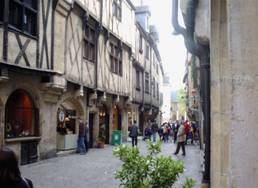The preferred audiovisual means are: Powerpoint, and overhead transparencies. Please, e-mail your ppt file to annie.vinter@u-bourgogne.fr before the conference. The following audiovisual means will be provided: TRANSPORTATION To get the Campus, Pôle 2AFE building, from the railway station for instance (Gare Foch) or from various places in the center of the city: Take Liane 5 (direction: Campus), stop at Esplanade Erasme (25 minutes on average from Gare Foch) Various ticket formulas are available. Choose the one which is right for you! ACCOMMODATIONS Below are the names and Web sites of a selection of hotels that are very centrally located and very close to the bus line that gets you directly to the University. You are advised to book your room early (through the web sites, preferential rates for most of them), because there are a lot of tourist events in September in Dijon.
More hotels : For students (but not only for students), less expensive rooms are available in the Campus (first-come, first serve). – 10 rooms “comfort” (toilets and shower in the room) are pre-booked: around 30 euros. Booking must be made before the 1st of July. OFFICIAL CONFERENCE DINNER The dinner will be held at Château de Gilly (http://www.grandesetapes.fr/fr/Chateau-hotel-gilly/restaurant-bar.html). WELCOME RECEPTION AND REGISTRATION Hall of the Pôle 2AFE, University of Dijon, Campus – Sunday, September 13, 2009, 17-20h. TOURS Hospices de Beaune (Tour organised for IGS2009, 17th September, Preregistration required, max: 42 people, first-come, first-serve) The Hôtel-Dieu was founded on 4 August 1443, when Burgundy was ruled by Duke Philip the Good (Philippe le Bon). The Hundred Years War had recently been brought to a close by the signing of the Treaty of Arras in 1435. Massacres, however, continued with marauding bands still roaming the countryside, pillaging and destroying, provoking misery and famine. Nicolas Rolin, the Duke’s Chancellor, and his wife Guigone de Salins, reacted by deciding to create a hospital and refuge for the poor. Over the centuries, the hospital radiated outwards, grouping with similar establishments in Pommard, Nolay, Meursault (the Hospices de la Charité). It became a community of carers, known as the “Hospices de Beaune”. Many donations –farms, property, woods, works of art and of course vineyards- were made to it. The institution is unique in its historical, philanthropic, and wine-producing heritage, and has become intimately linked with the economic and cultural life of Burgundy. http://www.hospices-de-beaune.com/fr/hospices/ Abbaye de Fontenay (Tour organised for IGS2009, 17th September, Preregistration required, max: 42 people, first-come, first-serve) The Fontenay Abbey, part of UNESCO World Heritage, is one of the oldest Cistercian monasteries in Europe. Founded in 1118 by St Bernard in a marshy Burgundy Valley, the abbey has not change its magnificient Romanesque style. Except for the refectory which was destroyed, all the rooms have been perfectly conserved: church, dormitory, cloister, council room, heating room, lodging for the abbots and the forge. The Fontenay abbey is located in northern Burgundy, 80 km north of Dijon. |
IGS 2009 Venueadmin112019-08-19T13:17:09+00:00



